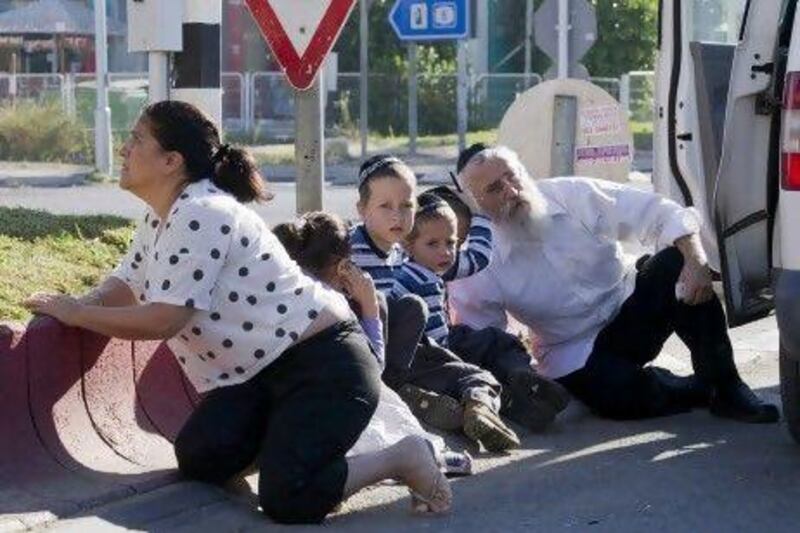TEL AVIV // Air-raid sirens blared out across Tel Aviv last night and residents ran for cover as Palestinian militants targeted Israel's second-largest city with rockets fired from Gaza.
One missile landed in an open area of Rishon Lezion, on Tel Aviv's southern outskirts. There were no casualties.
The Israeli military said another two rockets had been fired at the city, and residents heard an explosion. Police believe the missiles may have landed in the sea.
Islamic Jihad's Al Quds Brigades claimed it had fired a one-tonne, Iranian-made Fajr 5 rocket at Tel Aviv and caused "a large explosion to shake the city" about 80 kilometres north of Gaza.
Its spokesman Abu Ahmed pledged that Israel would experience "further surprises so long as the aggression against the Palestinian people continues". Five Palestinians and three Israelis were killed yesterday in the second day of violent clashes between Israel and Gaza militants, the worst since Israel's deadly onslaught in the Hamas-ruled enclave four years ago.
In an indication that Israel may launch a ground invasion, Benjamin Netanyahu, the Israeli prime minister, warned that Israel "will not tolerate" rocket fire by Gaza militants.
The Israeli defence minister Ehud Barak approved the call-up of 30,000 reserve soldiers, who can be called into action at any point.
"We are in the process of expanding the campaign," Brigadier General Yoav Mordechai said.
Israeli warplanes, tanks and gunboats bombed dozens of targets across Gaza on Wednesday and yesterday. Israel claims it was attacking sites from which Palestinian militants had launched rockets.
The rocket fire on Israel increased after the assassination of the Hamas military chief Ahmed Al Jabari a top leader in Gaza on Wednesday.
At least 15 Palestinians have been killed in the strikes so far, including a pregnant woman and three children, and dozens have been wounded.
In response, Hamas and other Palestinian groups in Gaza fired more than 200 rockets on southern Israeli communities, where residents were ordered to remain near blast shelters.
In the town of Kiryat Malachi, 25km north of Gaza, two men and a woman were killed when their four-storey apartment building was hit by a rocket, the first Israeli fatalities of the military campaign.
Some Israeli commentators have criticised Mr Netanyahu for looking to gain more popularity with voters ahead of January's general election by appearing tough on defending the country's security and shifting public attention away from economic and social hardships.
The Israeli offensive threatened to further unravel already delicate ties with Egypt, with whom Israel has a peace treaty, as the Egyptian president Mohammed Morsi recalled Cairo's ambassador to Israel and criticised the strikes as "unacceptable". Hamas is an offshoot of the Muslim Brotherhood.
The group called for a Day of Rage in Arab capitals for today, while hundreds of Tunisians protested in Tunis against the Israeli campaign.
The Egyptian prime minister Hisham Qandil will visit the Gaza Strip today. "We welcome this visit and appreciate this courageous stand," Hamas spokesman Taher Al Nunu said. The United States called on Egypt to use its sway with the Palestinians to try to end the violence, and said Hamas must stop its rocket attacks on Israel. "We ask Egypt to use its influence in the region to help de-escalate the situation," deputy state department spokesman Mark Toner said.
Palestinian officials from the West Bank-based Palestinian Authority condemned the Israeli campaign and said its timing was aimed at shifting international attention away from the Palestinian plan to seek statehood recognition at the United Nations General Assembly in late November.
Israel fiercely opposes the move, fearing such recognition may undermine its hand in peace talks.
Riyad Mansour, the Palestinian representative to the UN, said yesterday at a closed-door emergency meeting on Gaza by the UN Security Council that Israel's action was "synchronised" with the Palestinians' intention to hold a vote in the General Assembly on November 29 to gain an "observer state" status at the UN.
"They are now opening a war against our people in the Gaza Strip to divert attention from the efforts in the General Assembly," he said.
The crisis has prompted Palestinian Authority president Mahmoud Abbas to cut short a European trip to seek support for upgraded UN status. The assassination ignited a fiery debate among Israelis on whether the campaign was justified.
Gershon Baskin, a Jerusalem-based peace activist whose ties with Hamas officials helped to bring about last year's landmark exchange between Israel and Hamas of a kidnapped Israeli soldier for hundreds of Palestinian prisoners, said Mr Al Jabari had been on the brink of agreeing to a ceasefire just hours before his death.
According to Mr Baskin, Israeli officials knew Mr Al Jabari had received a draft agreement for a long-term ceasefire on Wednesday but had nonetheless decided to kill him.
"They made a strategic mistake that will cost the life of no few people on both sides … unfortunately [Mr Netanyahu and defence minister Ehud Barak] will get more votes because of it," he told Haaretz newspaper.
[ foreign.desk@thenational.ae ]
* With additional reporting by Joe Lauria at the United Nations and Agence France-Presse





